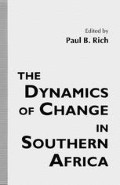Abstract
Before the state, there are “states of mind”.
Access this chapter
Tax calculation will be finalised at checkout
Purchases are for personal use only
Preview
Unable to display preview. Download preview PDF.
Notes
This is most usefully surveyed in Ernest Gellner, Nation and Nationalisms ( Ithaca, NY: Cornell University Press, 1983 ).
Anthony Smith, State and Nation in the Third World ( Brighton: Wheatsheaf, 1983 ).
O. O. MacDonagh, States of Mind: A Study of the Anglo-Irish Conflict ( London: Allen and Unwin, 1983 ).
H. Adam and K. Moodley, South Africa without Apartheid ( Berkeley: University of California Press, 1986 );
J. D. Brewer, After Soweto: An Unfinished Journey ( Oxford: Clarendon Press, 1986 );
M. Murray, South Africa: Time of Agony, Time of Destiny ( London: Verso, 1987 ).
H. Adam, “Survival Politics: Afrikaners in Search of a New Ideology”, Journal of Modern African Studies, 16: 4 (1978);
G. Fredrickson, “Can South Africa Change?”, New York Review of Books, 28 October 1989, pp. 48–55.
Quoted in Douglas Booth, “South Africa: the Politics of Pre-negotiations, 1989–91”, Australian Journal of Political Science, 27 (1992), 478.
L. M. Thompson, The Political Mythology of Apartheid ( New Haven: Yale University Press, 1985 ).
J. J. Eddy and D. M. Schreuder, The Rise of Colonial Nationalism: Australia, New Zealand, Canada and South Africa, First Asset their Nationalities, 1880–1914 ( Sydney and London: Allen and Unwin, 1988 ).
H. Adam and H. Giliomee, Ethnic Power Mobilised: Can South Africa Change? ( New Haven and London: Yale University Press, 1979 );
H. Giliomee, “The Beginnings of Australian Nationalism, 1870–1915”, South African Historical Journal, 19 (1987), 115–42.
D. M. Schreuder, The Scramble for Southern Africa: The Politics of Partition Reappraised (Cambridge: CUP, 1980 ).
D. M. Schreuder, “The Historian as Colonial Nationalist: G. M. Theal and the Making of South African History”, in G. Martel (ed.), Studies in Modern British Imperial History ( London: Macmillan, 1980 );
C. C. Saunders, The Making of the South African Past ( Cape Town: David Philip, 1980 ).
Ronald Hyam, The Failure of South African Expansion, 1910–1948 ( London: Macmillan, 1972 );
Martin Chanock, Unconsummated Union: Britain, Rhodesia and South Africa, 1910–1945 ( Manchester: Manchester University Press, 1977 );
P. R. Warhurst, “Smuts and Africa: a Study in Sub-imperialism”, South African Historical Journal, 16 (November 1984), 82–100.
N. Stultz, Afrikaner Politics in South Africa ( Berkeley: University of California Press, 1974 ).
Janet Robertson, Liberalism in South Africa, 1910–1948 ( Oxford: Clarendon Press, 1971 ), p. 7.
Harold Macmillan, Pointing the Way ( London: Macmillan, 1972 ).
J. D. B. Miller, “South Africa Departs”, Journal of Commonwealth and Comparative Politics, 1: 1 (1961), 56–74.
N. C. Manganyi and A. Du Toit (eds), Political Violence and Struggle in South Africa (London, 1990 ).
R. Lee and L. Schlemmer (eds), Transition to Democracy ( Cape Town: Oxford University Press, 1991 ).
African National Congress, Strategic Perspectives ( Johannesburg: ANC, 1993 ).
Hermann Giliomee, “The Last Trek? Afrikaners in Transition to Democracy”, in N. Etherington (ed.), Peace, Politics and Violence in the New South Africa ( London and Melbourne: Hans Zell, 1992 ), pp. 28–45.
Editor information
Editors and Affiliations
Copyright information
© 1994 Paul B. Rich
About this chapter
Cite this chapter
Schreuder, D. (1994). The Power of Colonial Nationalism in Shaping Post-Colonial South Africa. In: Rich, P.B. (eds) The Dynamics of Change in Southern Africa. Palgrave Macmillan, London. https://doi.org/10.1007/978-1-349-23617-6_4
Download citation
DOI: https://doi.org/10.1007/978-1-349-23617-6_4
Publisher Name: Palgrave Macmillan, London
Print ISBN: 978-1-349-23619-0
Online ISBN: 978-1-349-23617-6
eBook Packages: Palgrave Political & Intern. Studies CollectionPolitical Science and International Studies (R0)

